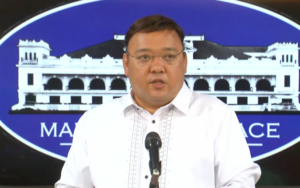MANILA, Philippines — Freedom of expression cannot be suppressed in the Philippines as Filipinos won’t allow it, Malacañang said Thursday, even as it claimed that such right is “not absolute.”
“I think dito sa Pilipinas hindi mo na talaga masusupil ang karapatang malayang pananalita dahil hindi na po papayag ang sambayanang Pilipino,” presidential spokesperson Harry Roque said in a televised press briefing.
(I think here in the Philippines you can no longer suppress the right to free speech because the Filipino people will never allow it.)
Roque was reacting to the claim of United Nations rights chief Michelle Bachelet that Asian nations, including the Philippines, were suppressing freedom of expression and tightening censorship during the COVID-19 pandemic.
The UN rights chief cited the provision in the Bayanihan to Heal As One Act, which penalizes spreading “false information.”
The provision allowed the National Bureau of Investigation to sent out “invitations” to individuals due to social media posts allegedly bearing false information.
While he noted that the justice system in the Philippines is functioning amid the health crisis, the Palace official insisted that “freedom of expression is not absolute.”
“It is subject to derogation and one form of derogation is criminal clause, ‘yung Penal Clause po nandiyan kabahagi ng Bayanihan to Heal As One Act. [Pero] ang magandang balita naman po ay gumagana ang ating mga institutsyon lalong lalo na ang ating mga hukuman, at marami po sa mga nakasuhan, dinismiss naman po sa ating piskalya pa lamang itong mga kasong ito. So the system works po,” Roque said.
(It is subject to derogation and one form of derogation is the criminal clause, the Penal Clause is part of the Bayanihan to Heal As One Act. [But] the good news is that our institutions work especially our courts, and many of the offenders, their cases have been dismissed. So the system works.)


